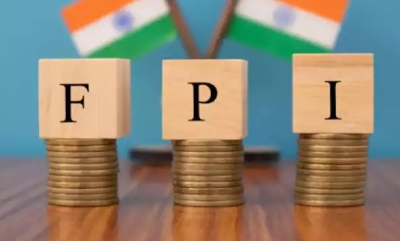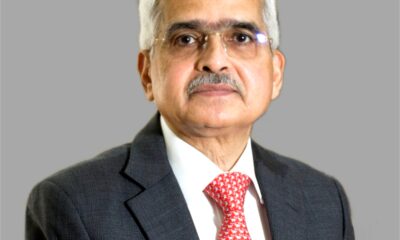Business
RBI, Centre have reined in inflation; weather plays spoilsport: Experts

Chennai, Aug 27 (IANS) The actions and strategies of the Reserve Bank of India (RBI) — increasing repo rates by 250 bps since last year, incremental cash reserve ratio — and the Central government’s export controls have ensured that inflation is relatively under control, opined economists.
India’s central bank, the RBI, acts to control inflation through its monetary policies while the government does that through governance, infrastructure development that brings down the transaction costs and other ways, they added.
“The RBI views inflation largely as a monetary phenomenon. Whether the inflation is due to supply or demand side, and whether it is driven by core or non-core components, the RBI believes that monetary policy intervention is required if the inflation rate breaches the tolerance zone,” Sujan Hajra, Chief Economist & Executive Director, Anand Rathi Shares and Stock Brokers, told IANS.
As a result, the RBI bases monetary policy on headline retail inflation (changes in cost of commodities, goods, services) rather than core retail inflation (changes in cost of services and goods excluding food, energy sectors).
According to Hajra, the RBI with its mandate for growth support, strikes a balance between inflation management and growth promotion.
“Consequently, the RBI may maintain an accommodative monetary policy stance to encourage growth even if the central bank is concerned about the current inflationary environment. Similarly, during periods of adequate growth and relatively low inflation, the RBI frequently takes proactive steps such as tightening monetary policy to prevent inflationary pressures from building up,” Hajra added.
According to Hajra the RBI’s actions aim to stabilise inflation around the target rate over the medium term. Furthermore, in addition to present inflation and the likely inflation in the future, the RBI’s actions take inflationary expectations into account.
“As of now the Monetary Policy Committee (MPC) has retained the repo rate at 6.5% but also continues with the withdrawal of accommodation stance. This was accompanied by the incremental cash reserve ratio (ICRR) which drew out Rs 100,000 crore of liquidity. Therefore from the monetary side the RBI is doing everything possible to control inflation,” Madan Sabnavis, Chief Economist, Bank of Baroda, told IANS.
Experts were of the view that the RBI’s actions had resulted in inflation being at a relatively steady level.
“To the extent possible, it has (RBI’s actions) worked. The RBI is keeping to a 1% real repo rate goal and hence will be tracking inflation. Monetary policy anyway cannot control food inflation when supply issues drive prices. But as long as headline inflation is high, the RBI will hold on to the repo rate without ruling out a hike if data warrants,” Sabnavis said.
According to Hajra, as a major lower middle-income emerging market economy with a high weightage of food products in the retail inflation basket, India has not experienced protracted periods of retail inflation in the double digits in the last three decades.
“Yes, there have been periods when the current inflation rate has been much higher than the RBI’s inflation target. In several of these circumstances, the RBI has purposefully allowed higher inflation, either to stimulate growth or because it believes the short-term surge in inflation is temporary. Based on the foregoing, it appears that the RBI’s inflation-control strategies have been effective,” Hajra said.
On the steps taken by the Central government to control prices, Hajra said the government’s behaviour and policies play a significant role in the country’s inflationary condition.
“Food inflation is the most volatile component of retail inflation in India. Food inflation, in turn, has a strong positive link with the administered prices announced by the government under the minimum support prices for roughly 30 agricultural products. Over the previous decade, the government has attempted to keep increases in minimum support prices minimal in order to keep food inflation under control,” Hajra said.
The government’s supportive policies also include legislative initiatives such as the implementation of the goods and services tax (GST), which has decreased market fragmentation and hence increased price discovery for a variety of items.
“The Central government strategies to sustain local supply of certain food products through export control and measures to increase imports for products with big domestic deficits are likely to assist containing inflation in the final months of the current calendar year,” Hajra said.
On export controls, Sabnavis said it will help only at the margin as once supply trails demand prices will remain high.
“The government has used export curbs more aggressively this time, though there have been repercussions in case of onions where the farmers are protesting. To counter this, physical stocks have been procured at export prices to assuage them,” Sabnavis pointed out.
According to Hajra, the government, by focusing on fiscal austerity, has taken steps to ensure that the money supply does not increase significantly, which would have a big feedback effect on the inflationary scenario. Further, improvements in infrastructure, including payment infrastructure, have lowered transaction obstacles and transaction costs, which has a positive feedback impact on inflation control.
While the weather played spoilsport and was the cause of the rise in food prices since July 2023, the arrival of a fresh crop by the end of the current calendar year is likely to alleviate domestic supply constraints significantly.
But again, the monsoon effects have been erratic and sowing has been affected for pulses, groundnut and cotton.
“It is believed that the sowing part is almost over and hence we can expect some shortfalls in output in these segments. This will keep prices under pressure as pulses prices have already moved up based on this expectation,” Sabnavis said.
Business
Sensex plunges to 2-months low by 930.55 points

Benchmark Sensex plunged by 930.55 points while broader Nifty dropped below the 24,500 level to settle at more than two-month lows on Tuesday due to an intense sell-off across sectors and massive foreign fund exodus from the capital markets.
Extending losses to the second day, the BSE Sensex plummeted 930.55 points or 1.15 per cent to settle at 80,220.72, the lowest closing level since August 14. During the day, it tanked 1,001.74 points or 1.23 per cent to 80,149.53. The NSE Nifty tumbled 309 points or 1.25 per cent to 24,472.10 as 47 of its constituents closed lower and three advanced. The index hit a low of 24,445.80 during the day. A weak earnings growth trend and sluggish global markets hit investor sentiment, analysts said, adding that rising US bond yields and policy actions by China are triggering FII outflows.
From the 30 Sensex pack, Mahindra & Mahindra, State Bank of India, Power Grid, Tata Steel, IndusInd Bank, Tata Motors, Larsen & Toubro, NTPC, Bajaj Finance and Reliance were among the biggest laggards. In contrast, ICICI Bank, Nestle and Infosys were the gainers from the pack.
Business
FPIs sold equities worth Rs 25,000 cr in Jan

New Delhi, Feb 3 (IANS) An important feature of the FPI flows in January this year was the divergent trends in equity and debt flows. While equity saw net selling of Rs 25,734 crore, debt saw net buying of Rs 19,836 crore. These figures are inclusive of cash market and primary market and others, says V.K. Vijayakumar, Chief Investment Strategist, Geojit Financial Services.
There are three reasons for this trend. One, the US bond yields rose to around 4.16 per cent in January from around 3.88 per cent in December 2023. This prompted outflows from equity to high yielding US bonds, he said.
Two, Indian equity became the most expensive in the world (Nifty trading at PE of around 21 based on FY24 estimated earnings). This triggered equity selling in India.
Third, some FPIs are doing the front running in the Indian bond market anticipating flows into the Indian bond market after the inclusion of India in the JP Morgan Emerging Market Bond Fund, he added.
Going forward, FPI inflows into the equity market will depend on the trends in the US bond yields and the equity market trends globally as well as in India. Since the US bond yields have again corrected sharply, FPIs are unlikely to sell in large volume in February. They may even turn buyers. The inflows into the debt market are likely to continue, he added.
Business
USISPF welcomes Joe Ucuzoglu, Raj Shah, Alex Rogers & Prashant Ruia into Board of Directors

Washington, Feb 3 (IANS) The US-India Strategic Partnership Forum (USISPF) is thrilled to welcome to its Board of Directors Mr Joe Ucuzoglu, Deloitte Global CEO; Mr Raj Shah, Co-CEO, MSI Surfaces; Mr Alex Rogers, President, Global Affairs and Qualcomm Technology Licensing for Qualcomm Incorporated; and Mr Prashant Ruia, Director, Essar Capital.
Ucuzoglu, who succeeded Mr Punit Renjen as Deloitte Global CEO in January 2023, also replaces Mr Renjen on USISPF’s Board.
As the Global CEO of the largest professional services organisation in the world, Ucuzoglu remains actively engaged with many of Deloitte’s clients as well as a range of external stakeholders, working to ensure that Deloitte is consistently leveraging the full breadth of its services to deliver impactful results for clients and communities.
Prashant Ruia is a second-generation entrepreneur of the Ruia family that founded Essar. He has been an integral part of Essar’s operations and management since 1985, playing a key role in driving the growth, diversification, and value creation, both within India and internationally.
Under his leadership, Essar is transitioning its existing assets towards a greener economy and investing in sector-transforming sustainable businesses.
Rajesh (Raj) Shah, along with his brother Mr Rupesh Shah, is President and Co-CEO at MS International, a leading importer and distributor of countertops, flooring, wall tile, and landscaping products in North America. The company was launched in 1975 by Raj’s parents, Manu and Rika Shah, founders of MSI, and first-generation immigrants to the United States.
Alex Rogers has been in numerous leadership roles since joining Qualcomm in 2001. Currently, he is a member of the Company’s executive committee and is responsible for government and public affairs, export compliance, corporate responsibility and leads Qualcomm’s patent licensing business.
Speaking on the recent appointments to the USISPF Board, USISPF President and CEO Dr Mukesh Aghi said: “The additions of Joe, Alex, Prashant and Raj accentuate the growing synergy in US-India ties across fields of critical and emerging technology, especially in semiconductors to deepening trade relations and collaborating in new domains in hydrogen and biofuels to build a clean energy economy.
“The year 2023 was a monumental year, with the success of Prime Minister Narendra Modi’s state visit to the US and President Joe Biden’s visit to India for a successful G20 Summit.
“With our ever-expanding Board and new captains of industry and distinguished leaders from the private sector, USISPF is better positioned than ever to build on the commercial and geostrategic aspects of the partnership in 2024.”
Commenting on his addition to the USISPF Board, Ucuzoglu said: “I am thrilled to join the Board of USISPF, an organisation that is key to strengthening the partnership between the U.S. and India and providing an important platform for stakeholders to come together to create meaningful opportunities for business, government and society overall.”
Rogers spoke about the importance of US-India technology ties, saying, “The US and India are uniquely positioned to use connectivity, processing, and artificial intelligence to advance the public good and stimulate economic growth.
“Qualcomm technologies and employees have been an integral part of India’s digital revolution over the past 25 years. We are proud to be part of the solution as digitization transforms the lives of people everywhere, whether it is how they work, connect, socialise, or interact with the environment.”
USISPF Chairman John Chambers congratulated the new appointees and said: “After all the groundbreaking accomplishments 2023 brought for the US-India partnership, I’m excited for the new year with the addition of these well-accomplished leaders to the USISPF Board.
“Alex, Prashant, Raj, and Joe will add even more breadth to USISPF’s roster of private sector experts, underscoring the passion from Fortune 250 companies to increase relations and business pursuits between the U.S. and India. These exciting appointments – along with others we’ve announced this year – position us for even greater success in the years to come.”
Commenting on his appointment to the Board of Directors, Ruia thanked USISPF Chairman John Chambers and USISPF President and CEO Mukesh Aghi and said: “I am thrilled to step onto the prestigious platform of the US-India Strategic Partnership Forum (USISPF) as a member of its Board of Directors. This appointment resonates with the mutual commitment to advancing stronger economic ties between the United States and India.
“I look forward to leveraging my experience to enhance collaboration, drive innovation, and further strengthen the strategic partnership between these two great nations, especially in fostering sustainability and ESG. We find ourselves in a momentous period for the diplomatic ties between the United States and India, and I am pleased to contribute to this significant endeavor.”
Raj Shah spoke about what the US-India relationship personally means to his family’s success story, saying: “India is playing an integral role in manufacturing and providing services to consumers in the United States. We look forward to working with the USISPF Board to continue to strengthen ties between the US and India.”
Business
Jeff Bezos to sell 50 mn Amazon shares in next 12 months

San Francisco, Feb 3 (IANS) Amazon founder Jeff Bezos is planning to sell at least 50 million company shares in the next year, the media reported.
According to a filing with the US Securities and Exchange Commission (SEC), Amazon, where Bezos currently serves as executive chair, said its billionaire founder had a trading plan for selling a maximum of 50 million shares.
The sales will occur “over a period” ending January 25 of next year “subject to certain conditions,” the filing read, reports Fox Business.
Bezos, who recently turned 60, owns nearly one billion shares of Amazon stock. Seven other top Amazon insiders took up trading plans for offloading Amazon shares, according to the SEC filing.
However, Bezos’ involved the largest amount of shares. Bezos’ stake in Amazon stocks make up a major portion of his $193.3 billion personal fortune.
Net sales for Amazon increased 14 per cent to $170 billion in the holiday quarter that ended December 31, 2023, compared with $149.2 billion in the fourth quarter of 2022.
Net income increased to $10.6 billion in the fourth quarter of 2023, compared with $0.3 billion in the fourth quarter of 2022. Amazon Web Services (AWS) segment sales increased 13 per cent year-over-year to $24.2 billion.
Amazon CEO Andy Jassy said the past holiday season was “record-breaking.” “This Q4 was a record-breaking Holiday shopping season and closed out a robust 2023 for Amazon,” said Jassy. “As we enter 2024, our teams are delivering at a rapid clip, and we have a lot in front of us to be excited about,” he added.
Business
Apple not to license Masimo’s patents despite Watch import ban

San Francisco, Feb 3 (IANS) Apple has no intention to license healthcare company Masimo’s blood oxygen detection to end the Apple Watch import ban.
Apple CEO Tim Cook told CNBC that the company is focused on appeals.
“We’re focused on appeal. There’s lots of reasons to buy the watch even without the blood oxygen sensor,” he was quoted as saying.
The Apple Watch Series 9 and Apple Watch Ultra 2 are still on sale in the US. However, these models being sold have the blood oxygen sensor disabled via software.
Apple Watch models sold before the import ban went into effect on January 18, 2024 will still have functional blood oxygen detection.
It seems likely that the blood oxygen detection function could be added back via a software update if the import ban ends, reports Apple Insider.
Masimo has said the company is willing to settle with Apple.
Apple resumed sale of its Watch Series 9 and Watch Ultra 2 last month without blood oxygen features amid the patent infringement dispute.
“Apple Watch Series 9 and Apple Watch Ultra 2 without the Blood Oxygen feature will become available from apple.com starting 6 am PT on January 18, and from Apple Stores starting January 18,” a company spokesperson had said.
“Apple’s appeal is ongoing, and we believe the US Court of Appeals for the Federal Circuit should reverse the USITC’s decision. We strongly disagree with the USITC decision and resulting orders,” said the company.
“Pending the appeal, Apple is taking steps to comply with the ruling while ensuring customers have access to Apple Watch with limited disruption,” the company said.
The new Apple watches were banned in the US after the ITC ruled that the blood oxygen sensors violated patents belonging to Masimo.
-
Video2 years ago
PM Modi Attacks Congress in Karnataka with “Kerala Story”
-
Politics1 year ago
Siddaramaiah & DK Shivakumar sworn in as Chief Minister & Deputy CM respectively
-
Cricket1 year ago
CSK players rejoice 5th IPL title with their families (Pics)
-
Entertainment1 year ago
Karan Deol weds his longtime Girlfriend Drisha Acharya (Pics)
-
Entertainment1 year ago
Urvashi Rautela dazzles on Cannes 2023 red carpet (Pics)
-
Sports6 years ago
History Of Official FIFA WORLD CUP Match balls
-
Entertainment1 year ago
Sunny Leone gets ready for Kennedy premiere in Cannes (Pics)
-
Entertainment2 years ago
Alia Bhatt looks crazy beautiful in Prabal Gurung creation at MET GALA 2023 (Pics)






































